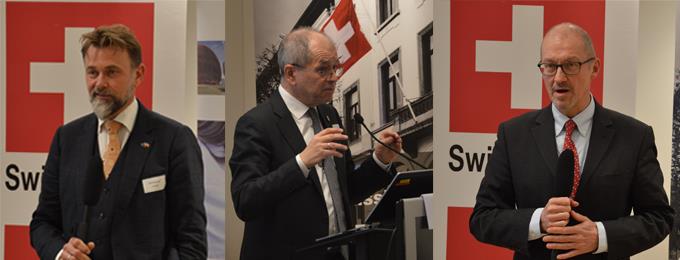How can the science community in Switzerland and in Europe contribute to achieving the United Nations (UN) Agenda 2030 and the Sustainable Development Goals?
The European Commission (EC) has sustainable development high on its agenda since the adoption of the United Nations Agenda 2030 in September 2015. Among their actions are the publication of a Communication and a Reflection Paper on the European Union’s (EU) Sustainable Development Goal (SDG) implementation strategy. The Reflection Paper, released on 30 January 2019, mentions education, research and innovation as ‘key enablers’, which underlie almost all SDGs. Strengthening these enablers is thus a priority for the EU. Against this backdrop, SwissCore organised a Swiss Science Briefing on ‘Switzerland, Europe and Beyond: Global SDGs and the Science Agenda 2030 for Sustainable Development’ on 28 February. The event provided a stage for representatives of Swiss- and European science institutions and the EC to discuss the role of research and innovation in solving global challenges and contributing towards the SDGs.
Keynote speaker Antonio Loprieno, President of the Swiss Academies of Arts and Sciences and of the European Federation of Academies of Sciences and Humanities (ALLEA), stimulated the discussion with a presentation on the Swiss science approach towards achieving the SDGs. He elaborated on the specific character of the Swiss science governance system, where the federal government takes a subsidiary role in supporting science and does not provide a top-down science and technology strategy. Government thus has limited instruments, especially in terms of funding, to engage the universities in addressing global challenges. Swiss universities need to come up with bottom-up initiatives with respect to sustainable development. Examples of actions taken so far include a joint conference of the Swiss science community and UNESCO in January 2018, the students’ initiative programme U Change for sustainable development and the founding of the Swiss Academies’ Sustainable Development Solutions Network Switzerland (SDSN).
Adam Tyson, Head of the Unit North America, Latin America and Caribbean, Directorate C – International Cooperation at the EC, and David Bohmert, Secretary General, Conference of European Schools for Advanced Engineering Education and Research (CESAER), responded to the keynote speech. Tyson explained how the EC plans to incorporate SDGs into the new research and innovation framework programme, Horizon Europe, by allocating research to global challenges through clusters under pillar II and crosscutting missions. Bohmert highlighted the importance of technical universities, which have been relevant throughout history in contributing to societal challenges through innovation and new technologies. Therefore, they will prove vital for addressing the current global challenges and deliver on the SDGs.
SwissCore and the Swiss Mission to the EU co-hosted this event and welcomed an audience of approximately 60 science stakeholders, including guests from European institutions and the private sector.
Programme: here
Short video clip on the event: here

